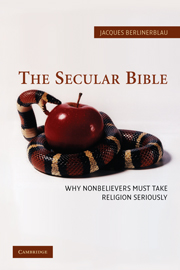Book contents
- Frontmatter
- Contents
- Preface and Acknowledgments
- Introduction: Secularists and the Not Godless World
- PART ONE THE COMPOSITION OF THE HEBREW BIBLE
- PART TWO THE INTERPRETERS OF THE HEBREW BIBLE
- PART THREE POLITICS AND SCRIPTURE
- Conclusion: Beyond Church and State: New Directions for Secularism
- Notes
- Index of Biblical Citations
- Index of Qur'ānic Citations
- Index of Rabbinic, Early Jewish, and Patristic Citations
- Index
Conclusion: Beyond Church and State: New Directions for Secularism
Published online by Cambridge University Press: 05 June 2012
- Frontmatter
- Contents
- Preface and Acknowledgments
- Introduction: Secularists and the Not Godless World
- PART ONE THE COMPOSITION OF THE HEBREW BIBLE
- PART TWO THE INTERPRETERS OF THE HEBREW BIBLE
- PART THREE POLITICS AND SCRIPTURE
- Conclusion: Beyond Church and State: New Directions for Secularism
- Notes
- Index of Biblical Citations
- Index of Qur'ānic Citations
- Index of Rabbinic, Early Jewish, and Patristic Citations
- Index
Summary
The fact of the matter is that secularism in our day can claim no energizing vision and no revolutionary élan, not as in the past. Instead, it sits passive and inert, heavily dependent upon the missteps and excesses of the Religious Right or some similar foe to make its case, stir up its fading enthusiasm, and rally its remaining troops. Secularism sits uneasy upon its throne, a monarch that dares not speak in its proper name, and dares not openly propound its agenda, if indeed it still has one. For all its gains, it seems peculiarly on the defensive, old and quaint, a tenured radical who has ascended to the endowed chair of culture only to spend its days shoring up the principle of stare decisis.
Wilfred McClay, “Two Concepts of Secularism”As far as most secularists are concerned, sacred texts are inconsequential relics, repositories of antiquated theopolitical mumbo jumbo. But if there is as much as one tangible “policy implication” to be gleaned from the present work, then it might be stated as follows: in the post-September 11 world, nonbelievers can no longer afford to remain oblivious to the combustive interplay of Scripture and ideas about Scripture. Even the most dim-witted secularist could not fail to construe recent current events as an invitation to think through the whole religion “thing” a bit more carefully.
- Type
- Chapter
- Information
- The Secular BibleWhy Nonbelievers Must Take Religion Seriously, pp. 130 - 142Publisher: Cambridge University PressPrint publication year: 2005



